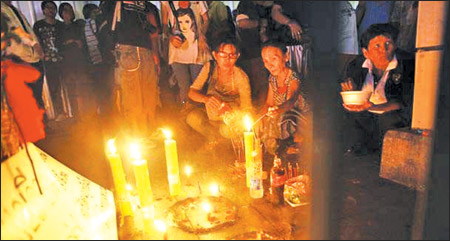Thailand lifts emergency rule in three provinces
Thailand said Tuesday that it was
lifting a state of emergency in three northern provinces but not in
Bangkok, two months after the end of anti-government protests in the
capital that turned deadly.
The emergency law, which bans public gatherings of more than five
people and gives security forces the right to detain suspects for 30
days without charge, will remain in place in 16 other provinces.
|

Anti-government red shirt protesters light candles for their
killed comrades during a gathering at Ratchaprasong intersection
in central Bangkok July 19, 2010. Despite the state of emergency
in the Thai capital that bans such gatherings, a group of red
shirts brought anti-government banners, flowers, food and
candles to the site of their former encampment and protests in
Bangkok’s shopping district that culminated in bloody clashes
with Thai troops exactly two months ago. Reuters Photo |
Earlier this month Thailand extended the emergency powers across
about one quarter of the country by three months, prompting concern
among rights groups and key allies including the United States.
The cabinet decided Tuesday to revoke the state of emergency in
Lampang, Roi Et and Sakon Nakhon provinces, in addition to five areas
where the decree was recently lifted, said deputy government spokesman
Supachai Jaismut.
“There are no political movements in those three provinces and local
officials are confident that they can handle the situation,” he said.
In the 16 other provinces, security officials report continued
political activities such as using community radio to incite unrest, as
well as fears of sabotage and assassination attempts on important
people, he added.
Two months of mass rallies by the Red Shirts, who were seeking
immediate elections, sparked outbreaks of violence that left 90 people
dead, mostly civilians, and nearly 1,900 injured, ending in a bloody
army crackdown in May.
Critics say the Government may be fanning the crisis as it clamps
down and censors the protest movement, which broadly supports fugitive
former premier Thaksin Shinawatra, rather than addressing its
grievances.
A visiting senior US envoy last week called for the state of
emergency to be lifted ‘as soon as possible.’
William Burns, the State Department’s number three, said that to
retain these powers indefinitely was ‘not healthy for a democratic
system.’
The authorities have used the powers to arrest hundreds of suspects,
including most of the top leaders of the “Red Shirt” protest movement,
and shut down anti-government TV channels, radio stations and websites.
New York-based group Human Rights Watch said earlier this month the
Government was ‘systematically using’ the emergency decree to hold
suspects without charge for up to 30 days in unofficial places of
detention. Many detainees have been held at military camps but their
exact numbers and whereabouts are unknown to their families, it said.
According to Human Rights Watch, putting detainees in the hands of
security personnel who often lack training and experience in civilian
law enforcement increases the risk of serious abuses.
- The Dawn |



